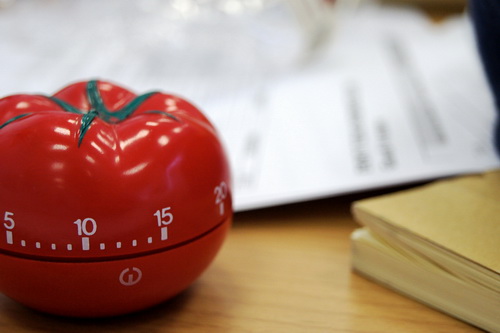No matter how you slice it, it can be difficult to get focused and settle down to study. However here’s a method which may make it a little easier. The Pomodoro Technique is a simple way to break up your study periods into timed, short periods of work, followed by even shorter units of rest. It’s like High Intensity Interval Training (HIIT) for your brain.
The technique was invented by an Italian university student named Francesco Cirillo, specifically to help him maximize the benefits of his study time. He chose the name “Pomodoro” because his original egg timer happened to be shaped like a tomato. Cirillo has since written a book about the technique and it has become extremely popular, especially within the tech community.
Everything you need to implement the technique the old-fashioned pen-and-paper way is freely available on the Pomodoro website. (You can even buy the official Pomodoro egg-timer on the site!) Alternatively, there are several free smartphone apps available.
How to Complete a Pomodoro
The basic technique has five steps:
- Plan the task you wish to complete.
- Set your timer to ring in 25 minutes and begin working on your task. Focus exclusively on the task, without breaking for any reason.
- When the timer rings take a short break (3-5 minutes). Stop abruptly, even if it means stopping reading mid-sentence. During the break, ignore the task completely. Do something completely different or take a bio break.
- Record that the Pomodoro has been completed.
- When you have completed 4 Pomodori take a longer break (15-30 minutes).
So, a Pomodoro To Do Sheet for a student revising for an upcoming Geography test might look like this:
|
Pomodoro To-Do Sheet
|
||
|
Revise Glaciers
|
x, x, x
|
|
|
Revise Rocks and Landscapes
|
x, x
|
|
Simple!
Why Does It Work?
The technique has several advantages which really become obvious as you begin to use it.
- The regular breaks improve concentration.
- Short breaks means there is no loss of focus. The break is refreshing, but not long enough to lose your place.
- Breaking a large task into short sprints helps prevent fear or perfectionism based procrastination.
- There are no distractions and interruptions. Almost anything can wait until the end of the Pomodoro!
- Most people find they become progressively better at optimizing the use of their breaks.
- Anything that interrupts or arises during the Pomodoro can be jotted down on the To-Do list as a new task. This leaves you free to power through like a champ.
With Pomodori you canned do anything! (Ed’s note: We do not condone all these tomato puns.)
Photo courtesy of lucasmascaro, flickr




